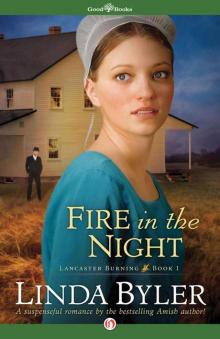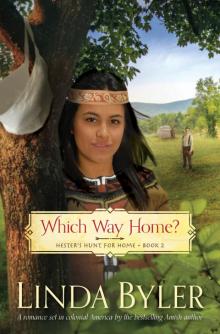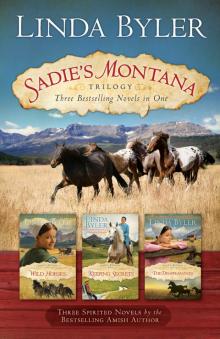- Home
- Linda Byler
Which Way Home? Page 2
Which Way Home? Read online
Page 2
She calculated the distance between them. Perhaps a hundred yards.
On they came now. Hester remained in the same position. Thoughts of being taken back to the farm entered her mind. She could go if she had to. She’d go. But she would walk all the way to the bishop’s house. John Lantz was a kindly man, stooped and aged, wise and loving, the best man Hester knew. She’d tell him about Hans. Bring down the golden castle of his pride.
Then, just as quickly, she knew that was an impossibility. Hans had done nothing wrong. His denial of wrongdoing would be accepted long before anyone would take her word. He actually had never acted on his thoughts.
Hester began to shiver, then to shake uncontrollably, her teeth chattering and clacking together, a riptide of her fear overtaking her. The sound of breaking twigs, the scuffling of leaves came closer. Would they be able to smell the fresh earth where she had torn briars away, moved stones and branches? Noah might, or Isaac, but not Hans.
Another shout. So close, Hester brought the tips of her fingers up to cover her ears, pressing in on them so hard they hurt, as if that course of action would shut out the men.
“Noah, shtup!” There was no answer except for the stillness, the ceasing of breaking twigs.
“There is no possibility of Hester traveling through this laurel,” Hans said, his voice high with irritation, fatigue, and anxiety, a voice Hester knew well.
Someone continued on, making less noise. They were so close. How could they see to move? They must have had lanterns, or perhaps only torches.
Then Hester heard breathing. Only when she took her fingers away from her ears did she realize how close either Noah or Isaac had stumbled. Another long silence, and then Hans directed his boys to retrace their steps.
The space of a few heartbeats seemed like an eternity. She heard level, even breathing, the raking aside of thorny branches. She did not move a muscle. If she were found, she’d have to go. But she’d devise another plan. Reasoning, calming herself as best she could, Hester remained motionless. Then she heard the breaking of the underbrush, the stillness as the breathing went away.
Hans bawled out another order to Isaac as the three men made their way down the side of the ridge, leaving Hester weak and so powerless she thought she might die of sheer relief. She remembered to thank God with one small, German prayer from her childhood, which made her feel a bit as if she should be caught and hung for treason. For how could she hate Hans and thank God?
Did God hear the prayers of someone like her? Or did he look upon her with mercy, understanding her plight? She didn’t know. She only knew that she needed to increase the distance between her and Hans as fast as she possibly could.
The racing of her heart would not allow her to relax, so she lay awake under the dark canopy of trees, trying to devise a plan. Should she avoid settlements? Or find a group of people and blend in among them? She had heard of the large community that started in Lancaster County east of her. Acceptance there seemed out of the question. Everywhere she traveled, she’d be an Amish Indian. An oddity. If she chose to dwell among civilization, she would have to desert the ways of the Amish. She’d need to stop wearing her muslin cap at least.
Weary, her thoughts upsetting, she decided to take one day at a time. Surviving was the most important thing. She’d travel fast, getting as many miles away from Berks County as possible. That was the best solution.
God would provide, or at least she hoped he would remember to look after her, walking through the wilderness in her bare feet without her muslin cap and with a heart filled with disgust for her father.
CHAPTER 2
WHEN THE FIRST STREAKS OF PINK LIGHT SEPArated the dark blue and gray of the early-morning sky, Hester was on her feet, the haversack bulging on her back, her eyes searching for the best route around the laurel. She was strangely exhilarated. She stepped out, moving swiftly as the light strengthened. She could see pine trees now, but who could have known they were there in the fast-fading light of evening?
She skirted the laurel, making her way over rocks and around thickets, but steadily up the side of the incline. On top, she ate some of the dried deer meat, drank sparingly of the water, and made her way quietly down the opposite side.
She guessed there was a creek, perhaps a spring, at the bottom of this ridge. She was surprised to find only a deep gouge containing layers of old leaves. A perfect place to sleep, but that time was not now. The sun was rising, a hot, red, shimmering orb of heat. Flies droned everywhere; bees hovered by the raspberry bushes.
Raspberries? Excitement pulsed through her veins when she realized how thick the raspberry canes stood along this small clearing. The purple berries grew profusely. Hester walked rapidly, plucking greedily at the sweetest berries. She lifted them to her lips, gobbling them like a starving bear. She ate until she could hold no more, thinking how berries satisfied hunger and quenched thirst at the same time.
That day, she calculated she’d walked a distance of fifteen miles. It was only a guess, but she knew she was in country she’d never seen or heard about. Tonight she’d start a small fire. But first, her water was all gone. She needed to find a stream. On top of the mountain, she’d figured there’d be a spring somewhere, but she’d been unable to locate one.
She knew the book of Indian medicines contained directions about how to find water using the forked branch of a peach tree, but those trees weren’t around, and besides, she wasn’t certain it would work.
She made her way down the mountain, clinging to small trees to lower herself. Thirst spurred her on. Her tongue was dry and heavy, her lips parched. She should have brought more water, should have known it was the dry summer season, and that water might not be as easy to find as she’d imagined.
A snake slithered across a flat rock, scaly and dry and brown. She was not afraid of snakes, finding them to be shy as long as they were undisturbed. The backs of her legs ached from the rapid descent, but she tried to ignore the pain, knowing the most important thing at the moment was to find a source of water.
The steep mountain leveled off a bit; the trees grew larger and farther apart, as if they received more nourishment to grow to this resplendent size. Hester smelled the river long before she saw it. It smelled of sulphur and iron and moisture. It smelled of mud and wet grass and dragonflies and butterflies. She increased her speed, her breath coming in gasps. Her mouth was painfully dry, her throat on fire. Ahead, the trees thinned even more.
Remembering caution, she slid soundlessly from tree to tree, her large eyes searching her surroundings for any sign of human habitation.
The clearing was surprisingly hard to get through, the thick grasses overgrown by wild rose bushes. Her feet were bleeding by the time she slid down the muddy bank of the river, plunging into the clear, brownish-green water like an otter and submerging her tired body completely. Then, rising to the surface, she cupped her hands and drank deeply, over and over, until the fiery thirst was gone.
She wished for soap. She rinsed her hair, clambered up the bank, and shook herself like a dog, then inhaled the pure, wet air, the pleasurable sensation of being without thirst. She felt alive, in control of her situation. What did she want for supper? Fish or wild game?
Schpeck and Sauerkraut? Stewed chicken and carrots?
Hester smiled, remembering the long plank table and the great bowls of food passed around to the thirteen hungry people. Saliva pushed into her mouth. She swallowed.
Efficiently then, she took stock of her situation. She’d have to stay beneath trees and away from the clearing. There was no sense in being a sitting duck. Why be free picking for unsavory characters? Or for bears that decided they had had plenty of fish for the summer?
She found a natural alcove with the trunk of a great tree at her back, the upturned roots of a fallen one beside her. It was perfect, shielding her from sight and protecting her from animals. All she needed was a roof.
No, that was not possible. She had not put enough distance between herself a
nd her family. She must stay rational, no matter how homey this natural little wonder appeared to her. She set about piling soft materials into a small hollow. She found grass, soft bark from the fallen pine tree, moss, and wonder of wonders, great sheets of old bark that she could peel from the dead tree. Perfect for a sleeping cover.
Squirrels chirred from the tree branches, so she bent swiftly, retrieved her slingshot, found a smooth stone by the river, and let fly an expert shot at the nearest, especially saucy one. Triumphantly she picked up the nice, fat, gray squirrel, one of the biggest she’d ever seen.
The round, orange sun was hovering just above the mountain to the east when Hester cleared a small area, then gathered dry leaves and very small dry twigs. She found a healthy hickory tree and pulled off the lowest, small branches. Then she began to rub them together, squatting on her haunches above the small pile of dry leaves.
She’d often done this and had shown Noah and Isaac the way of it. There was a trick to attaining enough friction, in the proper span of time, with the right amount of dry leaves to catch those first few sparks. But now she was hungry and tired, and her arms felt soft and pliable when she had rubbed for only a minute or more.
She continued, faster and faster, her shoulders hunched, her teeth pressed together as she concentrated on starting a fire to cook the squirrel.
She could not stop the friction to check how hot the branches were becoming. Her breath came in rapid puffs, and the muscles in her arms knotted, sending up spasms of pain as her fingertips heated up. Good. Faster now. Only a while longer.
A thin, white plume of smoke curled up from the peeled hickory branch, followed by a few orange sparks. Hester moved her hands even faster. More sparks fell on the dry leaves. A gray curl of smoke blackened the edge of a leaf, then another. Still Hester’s hands flew back and forth, as more sparks showered on the dry leaves.
Suddenly a bright orange and yellow flame danced to life. Quickly, she flung the hickory branches to the ground and sifted dry leaves over the small, orange flame. Her eyes lit exultantly when the flame grew large, licking greedily at the dry twigs Hester placed on top.
As soon as the fire was started well, she surrounded it with stones, then fashioned a spit from green branches. Taking up her knife, she cleaned the squirrel with a few expert slices, then cut off its head, legs, and tail, drawing the skin down and away from the carcass. She impaled the prepared squirrel on the green branch, hung it low above the now crackling fire, and lay down on the bed she had made for herself to wait hungrily until the meat was done.
As the shadows lengthened across the river, the trees’ reflections became longer and darker, the water no longer friendly the way it had been with the sun glinting on it. When sun shone on water, it created light, like ice. Sometimes the light was blue or yellow or clear, but it always brought light and joy to Hester, no matter if the day had turned into drudgery.
She wanted to stay here by the river always. She picked the hot meat off the bones, crunching it with her fingers and in her mouth. She ate every scrap of meat, sucking it off the tiny, fragile bones, then chewing a few of them and eating the small bits of marrow. Marrow was life-giving, filled with iron and other good minerals, so she ate every morsel she could find.
She threw what little remained of the squirrel back into the fire, took a long drink of the tepid river water, and settled herself comfortably for the night. The river ran silently toward the east. Only occasionally, Hester heard the splash of a leaping fish in the distance. A loon called its ribald laughing sound. Another answered, then another. Bats wheeled and drove through the evening sky, marauders after every flying insect. Mosquitoes buzzed in Hester’s ears. She slapped at them, then drew her hair across her ears to keep them away.
Exhaustion filled her mind and her body. Sleep overtook her, and she knew nothing more until the first light of dawn played across her brown face.
She scratched the red coals back to life, added dry twigs and small pieces of wood, then went to the river to wash.
The day was cool and fresh, the grasses hanging heavy with drew. Her bare feet were soaked by the time she reached the river. She stood on the bank of the slow-moving water, stretched her arms over her head, and caught the light of the sun’s first rays, as tenderly warming as the heat from the fireplace on the winter mornings of her childhood.
She caught a fat, slow, brown carp beneath a tree root with her bare hands, a skill she’d developed along with her brothers. She cleaned the fish, grilled it fast over the hot fire, and ate all she could hold. The fish was not very tasty, but Hester knew beggars can’t be choosers, as Annie would say. She did not know when she would eat well again. She considered spending the day catching fish and drying them, but then thought better of it. She needed to keep moving as fast as possible.
She continued along the riverbank until she found an area of the river that appeared shallow. She began to pick her way across, her bare feet feeling for rocks that were sharp or holes that appeared unexpectedly. There was nothing in her sack that could not get wet if she needed to swim, except for the volume of Indian medicines. She could not have it destroyed by water or stolen. Nor could she lose it. The book contained the only wisdom she could use to make her way in the world.
She would apprentice to a midwife. Or a doctor. She’d figure it out, once she had put enough distance between her and Hans Zug.
She reached the opposite side without mishap and kept moving straight up the mountain without looking back. She knew she would not find a cleared spot again like the one where she had spent the previous night. She had covered the area with grass and rocks so that every trace of the fire was gone. She had put the large piece of bark back on the tree. No one could tell that it had been pulled off and served as her cover. Even someone following her would not know.
A cold chill chased itself up her spine. She looked back over her shoulder. The morning light barely penetrated the covering of leaves, leaving the mountainside dark and wet with the night’s dew. She glanced over her shoulder again. She stopped, caught her breath, then resumed climbing. Up, up, she went as the sun rose, too, heating the side of the mountain. Perspiration broke out on her forehead and trickled down her back, yet still she climbed, her steps long and even, her breathing hard but steady.
She looked down the way she had come. Why couldn’t she shake the feeling of being followed? She stopped, turned slowly in a half-circle, and assessed her situation, trying to calm herself. There was nothing but rocks, trees, bushes, and the usual mountainous terrain. Nothing out of the ordinary. A blue jay called its raucous cry, but that did not necessarily mean anything. It was big and bold like blue jays are, leaders of the bird world, or as they imagine themselves to be, crying out about everything, even a big, green, walnut letting loose and crashing to the forest floor. She climbed on, then stopped to uncork the jug of water and swallowed large, thirsty gulps, before stopping herself.
Now on top of the mountain, she laid down her sack of belongings and looked for a tree with low branches. She swung herself up, hand over hand, pulling herself from branch to branch until she came close to its top. She had found a panoramic view of the river and could see down the way she had come. Perhaps this would take away her unsettled feeling. The sun was white hot, the air shimmering with heat and humidity. Falling away as far as she could see were tree-covered mountains and hills, like little bumps of green—the dark green of the pines, the lighter green of oak, maple, hickory, ash, and chestnut, the pale green of locust—all these millions of trees.
Hester had no idea how much a million was, or a thousand, for that matter, but she figured it would take an awfully long time to count them all.
Her eyes located the small clearing, the edge of the forest where she had slept. For a long moment she kept her eyes on that spot, never moving them. The grass was pale green, almost yellow. Along the edge of the sparkling brown river, the cattails were darker. Absolutely nothing appeared to be moving. She was probably too far away to t
ell.
She checked the branch below her, ready to descend, then looked one more time out over the trees below her. A part of the pale green grass had a dark spot. One she had not noticed earlier. A rock?
As she watched, the dark spot moved toward the river, then stopped. Hester knew it was not a black bear or a deer. It was a man. Who, she could not tell. Her eyes narrowed as she evaluated her situation. He may not be following her at all. He might just be a traveler, too, searching for a way across the river like she was. She had no reason to be alarmed.
She had a long running start away from him if he was following her. He’d have a hard time keeping her trail, as far upriver as she’d gone away from the shallow water. Confident now, she climbed slowly out of the tree, dropped to the ground, and landed squarely on her feet. She picked up her haversack and continued down the other side of the mountain.
By late afternoon, she was hot, tired, and hungry. She found two creek beds filled with rocks and small, yellow, locust leaves that drifted down from tired, dry trees. But not a drop of water. She drank sparingly, just enough to keep the misery of thirst at bay, and kept walking fast.
She picked her way among rocks now, coming to a hill covered with dead, fallen trees, where sharp limestone rocks were piled one on top of the other. The place appeared to be cursed, as if nothing green were blessed enough to grow there.
She stopped. The heat waved and shimmered, a thing alive, pressing down on her head and her lungs, burning her back with its power. Her whole body cried out for water. She uncorked the jug, took a swallow of the warm river water, then forced herself to put the cork back in its place.
Bent on all fours now, she crept along the rocks, her feet shaping themselves to the formations, her hands steadying her progress. When she came up over a rise, she gasped. So this is what happened. Lightning had struck, starting a fire. From blackened stumps and gray ash, tender green trees were emerging from the burned ground. The rocky area had stopped the raging fire.

 A Second Chance
A Second Chance Lizzie's Carefree Years
Lizzie's Carefree Years The More the Merrier
The More the Merrier Love in Unlikely Places
Love in Unlikely Places Running Around (and Such)
Running Around (and Such) Wild Horses
Wild Horses Lizzie Searches for Love Trilogy
Lizzie Searches for Love Trilogy Lizzie and Emma
Lizzie and Emma Little Amish Matchmaker
Little Amish Matchmaker The Witnesses
The Witnesses The Healing
The Healing Home Is Where the Heart Is
Home Is Where the Heart Is Fire in the Night
Fire in the Night When Strawberries Bloom
When Strawberries Bloom Little Amish Lizzie
Little Amish Lizzie Which Way Home?
Which Way Home? The Homestead
The Homestead Sadie’s Montana Trilogy
Sadie’s Montana Trilogy Davey's Daughter
Davey's Daughter Hester on the Run
Hester on the Run Disappearances
Disappearances Big Decisions
Big Decisions Becky Meets Her Match
Becky Meets Her Match Hope on the Plains
Hope on the Plains Christmas Visitor
Christmas Visitor